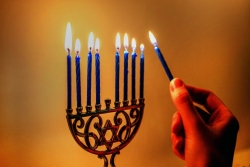Celebrate Torah
Every year, the season of reflection and renewal is culminated by the celebration of Simchat Torah (literally “the rejoicing of the Torah”).
Drawing Near to Torah
I did not have a typical Reform Movement upbringing, and would say that the three years I lived on an island in Alaska are probably most emblematic of that.
Reflecting on Simchat Torah
Thanks to social media and electronic devices you can check in on Foursquare and read the Mishkan T'filah prayer book on a handheld device at the same time. Yet for all the modern inventions, the Torah remains unaffected.
Rethinking the Holy Days
I’ve come to the conclusion we need to change the date of Simchat Torah. Our Jewish festivals must be re-envisioned as inspirational community gatherings of joyful spiritual Jewish celebration. Every single festival needs to be a time of great community involvement and meaning.








